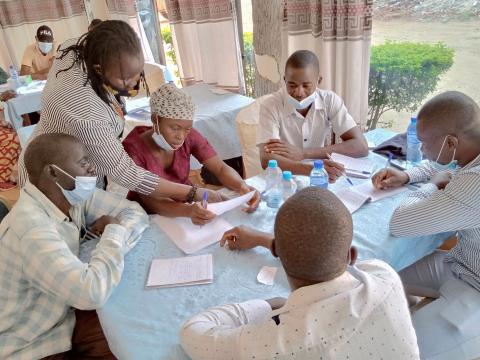South Sudan’s health workers join campaign on child protection and safeguarding

“This is my first time to attend a training on safeguarding. Before, I just assumed it was normal for health workers to have sexual relationships with their patients since they are part of the community we live in, as long as it imposes no risks”, says Rose*, a health worker.
World Vision is committed to creating and promoting a protective environment for girls, boys, women and men, in the communities we serve, within the organization and partners. It applies a “zero-tolerance” approach to child protection violations, sexual exploitation and abuse.
Guided by World Vision’s Child Protection and Safeguarding Policy, a training with 37 health workers was facilitated by Advocacy and Protection Manager Betty Adong and Western Equatoria Zone’s People & Culture Coordinator Jackline Muraa to shed light and review these key protection and safeguarding concerns.

The health workers from Yambio and Nzara counties coming from different health facilities supported by World Vision through the Health Pooled Fund (HPF), attended the full-day safeguarding training on 23 August 2021 held in Yambio County focused on the prevention of sexual exploitation and abuse, and other related protection issues.
Eleven women and 26 men participated composed of health directors, coordinators, nurses and other health staff. Many of them recommended that more training sessions should be consistently and periodically conducted to keep up with the challenges in the communities.
Further, some suggested during the discussion, should include all World Vision’s service providers, partners from different organizations, government and community leaders. A widespread awareness will help prevention take root and help protect the vulnerable population.
This is my first time to attend a training on safeguarding. Before, I just assumed it was normal for health workers to have sexual relationships with their patients since they are part of the community we live in, as long as it imposes no risks.
“This kind of training remind us of who we are, what we need to do, and avoid, as we face situations at work. More community awareness is needed to make them aware what is not acceptable in World Vision’s standards and of course, with the people we serve”, adds Joseph, another health worker.
Several participants noted the following ideas to take into their area of responsibility include overall awareness of protection, reporting mechanisms, clear communication channels, the importance of reporting timelines (within 24 hours); and a better understanding of the existing constraints and barriers that exist when it comes to reporting, especially for beneficiaries.

Other recommendations included consent on the job, use of appropriate language, stewardship, confidence and responsiveness, keep the community members aware of the reporting channels and open participatory approaches, engaging with elders in the community for better awareness of child protection and safeguarding.
“I feel empowered to observe the right steps for confidential reporting and I am happy that there is a way to assist those who need assistance. Prevention of sexual exploitation abuse should also be included in the training with communities”, shares Martha.
World Vision has zero tolerance of incidents of violence or abuse against children and other people in the communities we serve, either committed by our staff or others connected to our work. We abhor any misuse of power, status, or trusted position for any sexual or other exploitative purposes.
Read more from World Vision’s Safeguarding Policy, Reporting Guidelines and Integrity & Protection Hotline.
Article written by Betty Adong, Advocacy and Protection Manager.